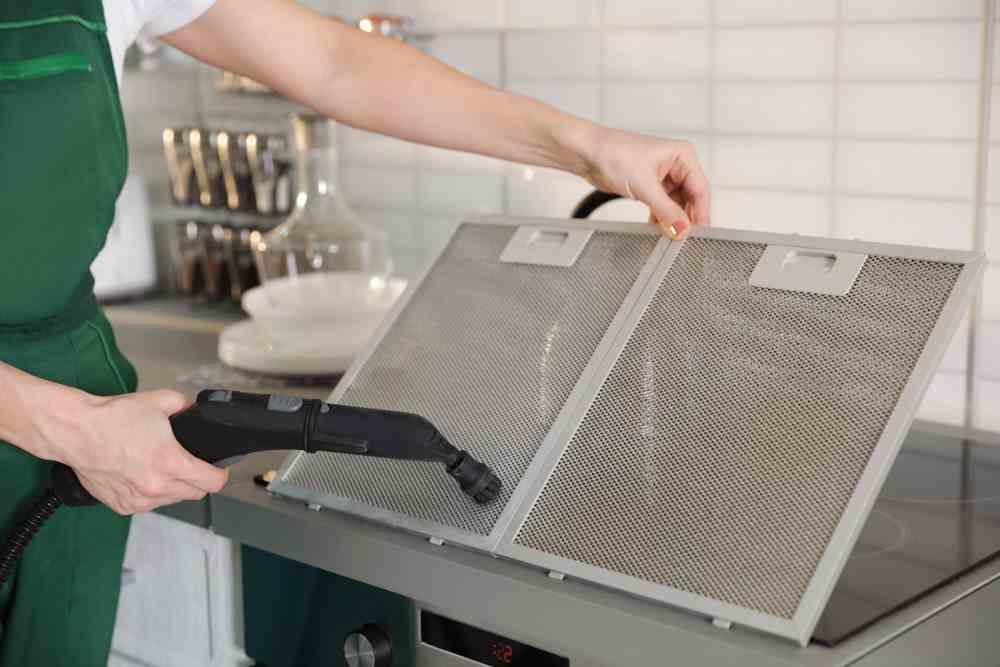Best Way to Remove Organic Debris From Kitchen Exhaust Systems

Ontario-wide Kitchen Exhaust and Hood Cleaning – Best prices and service guaranteed.
Kitchen exhaust systems play a crucial role in maintaining a clean and healthy environment in commercial kitchens. However, over time, these systems can accumulate organic debris such as grease, oil, and food particles, which not only pose a fire hazard but also reduce the efficiency of the exhaust system. Therefore, it is essential to regularly clean and remove organic debris from kitchen exhaust systems to ensure optimal performance and safety. In this article, we will explore the best practices and methods for effectively removing organic debris from kitchen exhaust systems.
The Importance of Removing Organic Debris
Before diving into the best practices for removing organic debris, it is important to understand why it is necessary. Here are some key reasons:
- Fire Hazard: Accumulated grease and oil in the exhaust system can ignite and cause a fire, posing a significant risk to the kitchen and its occupants.
- Health and Safety: Organic debris can harbor bacteria, mold, and other pathogens, which can contaminate the air and food in the kitchen, leading to health issues for both employees and customers.
- Efficiency: A clogged exhaust system reduces its efficiency, resulting in poor ventilation, increased energy consumption, and potential equipment malfunction.
Ontario-wide Kitchen Exhaust and Hood Cleaning – Best prices and service guaranteed.
Best Practices for Removing Organic Debris
Now that we understand the importance of removing organic debris, let’s explore the best practices and methods for achieving a clean and efficient kitchen exhaust system:
1. Regular Inspections
Regular inspections are crucial to identify any signs of organic debris buildup in the exhaust system. These inspections should be conducted by trained professionals who can assess the condition of the system and determine the appropriate cleaning frequency.
2. Professional Cleaning Services
Ontario-wide Kitchen Exhaust and Hood Cleaning – Best prices and service guaranteed.
While regular inspections are important, professional cleaning services are essential for the thorough and effective removal of organic debris. These services employ specialized equipment and techniques to ensure all components of the exhaust system, including ductwork, fans, and filters, are properly cleaned.
It is recommended to hire professional cleaning services at least once every three to six months, depending on the volume of cooking and the type of establishment. High-volume kitchens, such as those in restaurants and hotels, may require more frequent cleaning.
Ontario-wide Kitchen Exhaust and Hood Cleaning – Best prices and service guaranteed.
3. Manual Cleaning
In addition to professional cleaning services, manual cleaning should be performed regularly to maintain a clean exhaust system. This includes wiping down surfaces, removing visible debris, and cleaning filters.
When manually cleaning the exhaust system, it is important to use appropriate cleaning agents that are safe for the system and effective in removing grease and oil. Avoid using harsh chemicals that can damage the system or leave behind residue.
4. Grease Traps and Filters
Ontario-wide Kitchen Exhaust and Hood Cleaning – Best prices and service guaranteed.
Installing and maintaining grease traps and filters is an effective way to prevent organic debris from entering the exhaust system in the first place. Grease traps capture grease and oil before they can accumulate in the system, while filters trap solid particles and prevent them from reaching the exhaust system.
Regularly inspect and clean grease traps and filters to ensure they are functioning properly. Replace filters as needed to maintain optimal performance.
5. Employee Training and Education
Ontario-wide Kitchen Exhaust and Hood Cleaning – Best prices and service guaranteed.
Proper employee training and education are essential for maintaining a clean kitchen and preventing organic debris buildup. Employees should be trained on the importance of cleaning and maintaining the exhaust system, as well as the proper procedures for doing so.
Regular training sessions and reminders can help reinforce the importance of cleanliness and ensure that employees are following the correct protocols.
Case Studies and Statistics
Let’s take a look at some case studies and statistics that highlight the importance of removing organic debris from kitchen exhaust systems:
Case Study 1: Restaurant Fire
Ontario-wide Kitchen Exhaust and Hood Cleaning – Best prices and service guaranteed.
In 2018, a restaurant in a busy city experienced a devastating fire that started in the kitchen. The cause of the fire was determined to be a buildup of grease and oil in the exhaust system, which ignited and quickly spread throughout the restaurant. The incident resulted in significant property damage and the temporary closure of the establishment.
This case study emphasizes the importance of regular cleaning and removal of organic debris to prevent fire hazards in commercial kitchens.
Case Study 2: Health Inspection Violation
In a recent health inspection of a restaurant, inspectors found excessive grease buildup in the exhaust system. The restaurant was issued a violation and required to clean the system within a specified timeframe. Failure to comply could result in fines and potential closure of the establishment.
This case study highlights the importance of maintaining a clean exhaust system to comply with health and safety regulations.
Ontario-wide Kitchen Exhaust and Hood Cleaning – Best prices and service guaranteed.
Regularly removing organic debris from kitchen exhaust systems is crucial for maintaining a safe and efficient environment in commercial kitchens. By following the best practices outlined in this article, such as regular inspections, professional cleaning services, manual cleaning, installing grease traps and filters, and providing employee training, kitchen operators can ensure that their exhaust systems are free from organic debris.
Remember, the consequences of neglecting proper maintenance can be severe, including fire hazards, health violations, and decreased efficiency. By prioritizing the removal of organic debris, kitchen operators can create a clean and safe environment for their employees and customers.
Read more about “How to Clean Organic Matter From Kitchen Exhaust Systems” here.
Frequently Asked Questions about The Best Way to Remove Organic Debris From Kitchen Exhaust Systems

Why is it vital to prioritize the removal of organic debris from kitchen exhaust systems?
The removal of organic debris, including grease, oils, and food particles, is paramount for several reasons:
Fire Prevention: Organic buildup, especially grease, is highly combustible and can lead to dangerous fires if ignited.
Air Quality: Accumulated debris can foster mold and bacterial growth, compromising indoor air quality and potentially affecting food safety.
System Efficiency: Organic buildup can obstruct airflow, leading to inefficient ventilation, higher energy consumption, and reduced equipment lifespan.
Regulatory Compliance: Regular cleaning to remove organic debris is mandated by many fire safety regulations to ensure a safe kitchen environment.
What’s the most effective method to eliminate organic debris from kitchen exhaust systems?
A multi-step approach is considered the most effective:
Inspection: Begin with a detailed assessment to pinpoint areas with significant organic buildup.
Application of Degreasers: Use industry-approved degreasers to break down hardened grease and oils.
Scraping and Brushing: Manually remove thick deposits using specialized brushes and scrapers.
High-Pressure Hot Water Cleaning: This method effectively dislodges and washes away residual debris.
Final Rinse and Sanitization: A thorough rinse followed by sanitization ensures the system is free from chemicals and contaminants.
How often should a kitchen exhaust system be cleaned to prevent organic debris accumulation?
Cleaning frequency varies based on cooking type and volume:
High-Volume or Solid Fuel Cooking: Monthly cleaning is advised.
Moderate-Volume Cooking: Quarterly cleaning typically suffices.
Low-Volume or Seasonal Cooking: Cleaning every six months or annually might be adequate. Routine inspections and staying updated on local regulations will offer specific guidance tailored to each kitchen.
Are there any tools or equipment recommended for efficient removal of organic debris?
Indeed, specialized equipment can make the process more efficient:
Inspection Cameras: These devices allow for a detailed view of internal ductwork, identifying problem areas.
Rotary Brushes: Ideal for scrubbing the inner surfaces of ducts and vents.
Pressure Washers: High-pressure washers, preferably those that use hot water, effectively rinse away loosened debris.
Vacuum Systems: These extract the washed-away debris, ensuring it doesn’t enter other parts of the building.
What precautions should be taken during the removal of organic debris from kitchen exhaust systems?
Safety and efficiency are crucial:
Avoiding Chemical Residues: Ensure all cleaning agents are thoroughly rinsed to prevent contamination and potential fire risks.
Wearing Appropriate Protective Gear: Technicians should wear gloves, goggles, and other protective equipment to protect against chemicals and debris.
Waste Disposal: Dispose of organic waste and cleaning residues responsibly, adhering to environmental regulations.
Regular Monitoring: Even after cleaning, routinely monitor the system to quickly address any re-accumulation of debris.
Consistent and thorough cleaning of kitchen exhaust systems not only ensures a safe kitchen environment but also optimizes the system’s performance. Adhering to best practices and local regulations is essential for all commercial kitchens.
- Best Way to Remove Organic Debris From Kitchen Exhaust Systems
- hood cleaning
- kitchen exhaust cleaning
- restaurant hood cleaning






